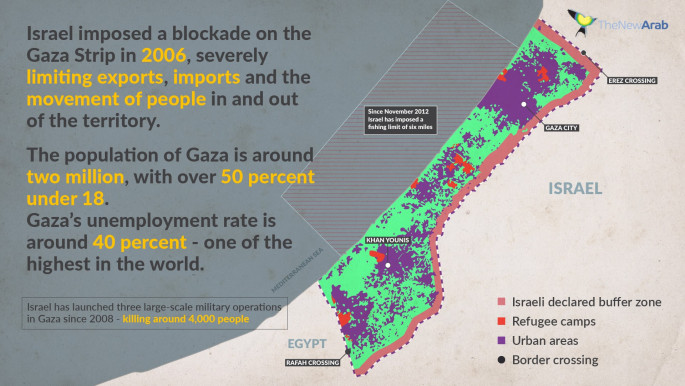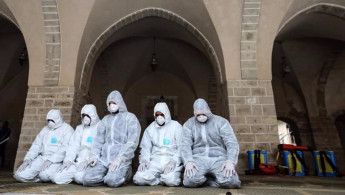'May God help us': Panic grips caged Gaza Strip after first coronavirus cases
Gaza's Ministry of Health announced that two Palestinians who had returned to the besieged enclave from Pakistan had been found to carry the virus. The men were immediately quarantined.
On 24 March, the website worldometer.org reported that there were 387,474 confirmed Covid-19 cases and 16,758 deaths worldwide. Palestine too has been hit, with 60 cases reported in the occupied West Bank, mainly in Bethlehem.
The Gaza Strip, however, was slow to be 'invaded' - with some satirically calling it the safest place on earth. To keep it that way, and in accordance with a declaration of emergency by the Palestinian Authority, schools and universities - along with some NGOs - closed.
But while online learning is a good replacement in other countries, in Gaza a good WIFI connection, or even laptops, are a rarity.
 |
|
| Read more: The Middle East at war with coronavirus |
Almost two weeks before the PA resolution, the Hamas government in Gaza declared its own preventive state of emergency, establishing quarantine centres near the Rafah crossing, where visitors enter Gaza from Egypt.
At first, they housed anyone exhibiting symptoms or who travelled from a hard-hit country like China - soon exceeding 700. Later, all people entering were examined and quarantined at home, totaling 2,708. And now, the crossings - both from Egypt and Israel - are closed altogether.
Everyone knows Gaza's hospitals lack the equipment and medicine to fight the disease, and Israel has allowed only 200 testing kits into the enclave. As a result, many of the two million residents in the overcrowded coastal territory are fearful that Covid-19 could easily kill thousands before it is contained, turning Gaza into a graveyard.
The announcement of Gaza's first cases by the Ministry of Health further exacerbated this collective anxiety. Yousef Abu Al-Reish, the undersecretary of the ministry, tried to assuage the population of two million, saying that the "two men were quarantined immediately and did not enter the Strip." Their health is considered stable.
Nevertheless, businesses across Gaza are closing.
Gaza 'safest place in the world'
Before the first confirmed cases, one of the oft-cited advantages Gaza was said to have was the Israeli blockade imposed in 2007.
Jean Pierre Felieu, a professor who writes for French newspaper Le Monde, began an article on Covid-19 by saying, "In the time of corona, Gaza is the safest place in the world due to the quarantine imposed on it for 14 years."
Comments like these had become a sort of a black joke among Gazans on social media, with morbid humour long a survival tactic among people in the enclave. One elderly man in a shared car was overheard saying, "May we get killed by it [COVID-19] and be done with this bad life."
 |
|
| A girl wearing a protective N95 mask sweeps outside her home in Gaza City. [Getty] |
Another quipped on social media, "My wife says: 'Within a week, if children haven't return to schools, I will invent the coronavirus treatment'."
Likewise, even as the state of emergency took hold in hospitals, Gazans flocked to public parks, beaches and restaurants. Said Altaweel, a local journalist, mockingly commented on the situation saying. "Happy Corona Eid (referring to a major Muslim holiday). Today women are taking their children out and visiting their families as if it's Eid."
The announcement of the first two people contracting the virus, however, is changing all that.
Conspiracy in the air
Stoking further hidden fears is a culture that looks for larger conspiracies, based on its history of subjugation and occupation.
 |
|
| Click to enlarge |
There had, for example, been widely circulating rumours that Israeli authorities would deliberately introduce one or two infected people into Gaza to further the population's demise.
After all, Israel spent billions during its 2014 attack on the Gaza Strip, killing more than 2,000 Palestinians. Why spend that much and put troops at risk when it can use biological warfare at much less cost, the conspiracies speculated.
A 2015 United Nations report predicted the Gaza Strip would be uninhabitable by 2020. Gazans have held on anyway, but the novel coronavirus outbreak is making the UN prediction sound more realistic by the day.
On resident, Mohammed Odah, wrote on his Facebook timeline: "2020 brought us an Israeli attack, the 'Deal of the Century,' a harsh winter and the coronavirus. May God save us!"



